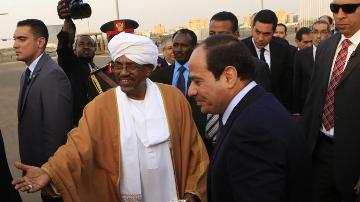Khartoum and Cairo agree on additional measures to secure joint borders
July 26, 2014 (KHARTOUM) – Sudan and Egypt have agreed to promote military coordination in order to protect the countries’ joint borders against smuggling rings, as wellas economic and security threats.

Subhi, on Saturday met the Sudanese investment minister, Mustafa Osman Ismail in the presence of Egypt’s chiefs of staff and the military attaché and chargé d’affaires at Sudan’s embassy in Cairo besides several other officials.
Ashorooq TV said that Ismail handed Subhi over a letter from his Sudanese counterpart, Abdel-Rahim Mohamed Hussein.
Hussein, according to the letter, praised military cooperation between Egypt and Sudan particularly on the border issue, stressing that Sudan supports Egypt’s efforts to secure the joint borders against threats.
Ismail said the meeting discussed ongoing arrangements to inaugurate the two land crossings of Ashkait and Argeen, pointing the former is expected to be opened in Mid-August while the latter will be opened at the end of the year.
Subhi, for his part, underscored the need to promote the Sudanese-Egyptian relations and make it the perfect model for the Arab-African interdependence.
He said the recent visit of president, Abdel Fattah al-Sisi, to Sudan sought to enhance economic cooperation and political coordination between the two countries at the regional and international levels.
The Egyptian defence minister further noted he looks forward to meeting his Sudanese counterpart in his planned visit to Cairo soon to discuss ways for promoting military ties between the two countries.
“There will be mutual visits between the two sides to discuss additional measures for securing the joint borders,” he said.
The Egyptian-Sudanese border is known to be a smuggling hotspot, and was also recently highlighted in a report by Human Rights Watch as a human trafficking route.
Last June, the Egyptian president made a lightening visit to Sudan. He flew to Khartoum from Equatorial Guinea’s capital Malabo where attended the 23rd Ordinary African Union (AU) summit.
Relations between Cairo and Khartoum have taken a downward spiral, particularly after Sudan announced its strong support of the Ethiopian Renaissance Dam.
Many Egyptian politicians and observers have expressed fury over Sudan’s stance with some going as far as calling Khartoum an “ingrate” and “treacherous”.
Some commentators have speculated that Khartoum wants to use the dam issue as a bargaining chip to claim back Halayeb which has been under Egyptian control since the 1990s.
The genesis of the dispute over Halayeb dates back to as early as 1958 after Sudan gained independence from being ruled jointly by Britain and Egypt. The wrangle is a result of a discrepancy in the demarcation of political boundaries set by the Anglo-Egyptian Condominium and the ones set earlier by the British in 1902.
Egypt brushed aside Sudan’s repeated calls for referring the dispute to international arbitration.
Khartoum is also accused by Egyptian media of supporting the Muslim Brotherhood movement which has been pushed off Egypt’s political scene after the toppling of president Mohamed Morsi last year by then army chief al-Sisi in response to mass anti-Morsi demonstrations in the country.
The Islamist government in Sudan has appeared uncomfortable with the ouster of Morsi given the common ideology they shared with him and the Freedom and Justice Party (FJP) which brought him to power.
(ST)
